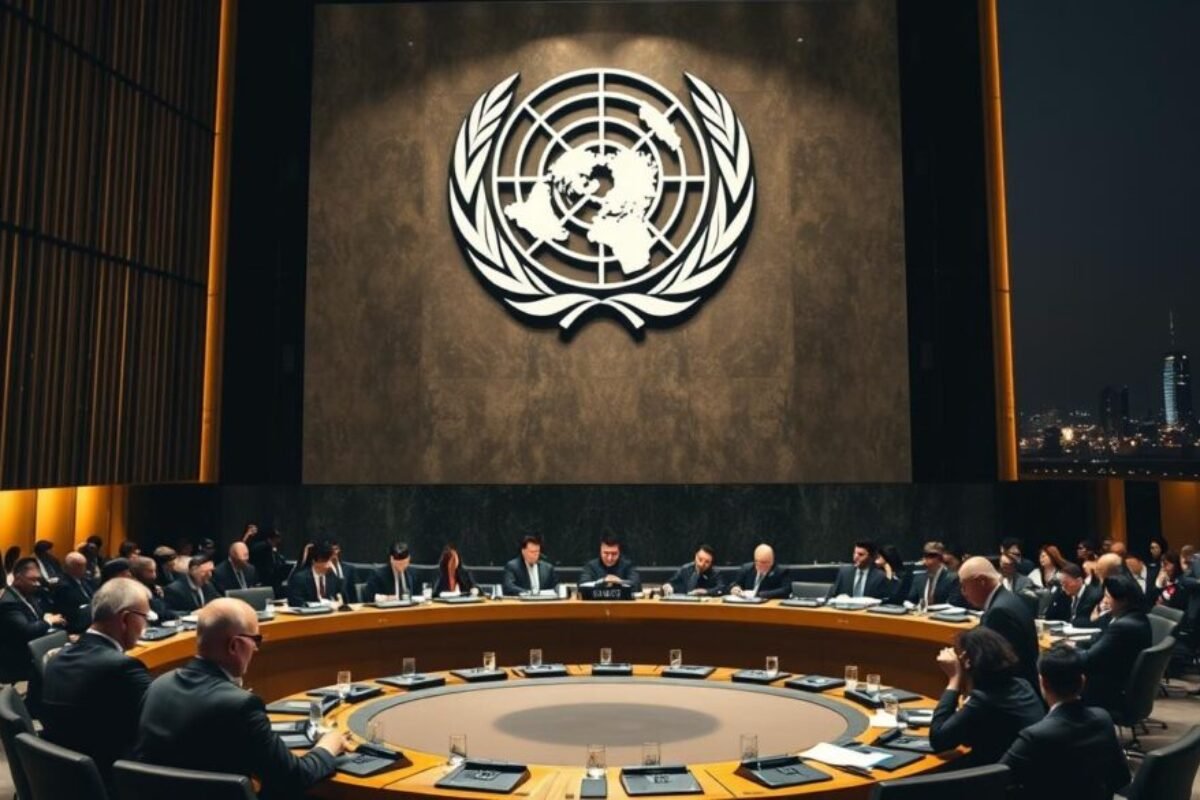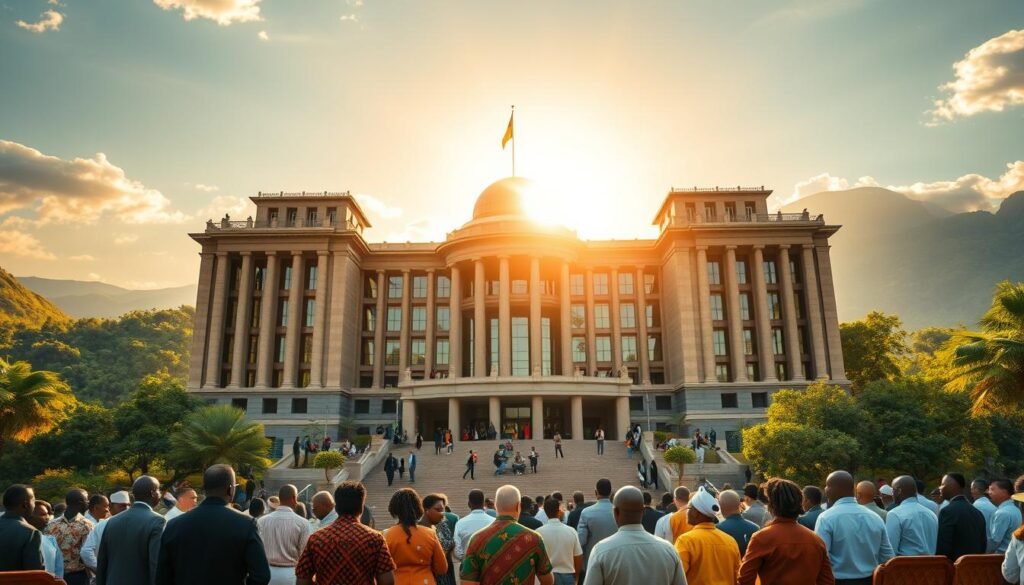The UN Security Council & The Imperative for Reform
Did you know the United Nations Security Council started with just 11 members over 70 years ago? Today, it has grown to 15 members, but only once. With the world changing fast, there’s a big push for UN Security Council reform. The Council faces challenges like global security and international governance that it can’t handle well today.
This shows we really need a big change in the UN Charter. We must make the Council work better for keeping peace and security around the world.
Key Takeaways
- The UN Security Council was founded with 11 members and has only expanded once to 15 members.
- There is a growing call for UN Security Council reform to address modern global security challenges.
- Global issues like climate change, terrorism, and pandemics necessitate a modernized Council.
- Enhancing international governance requires structural and functional reforms within the Council.
- A thorough UN Charter amendment is key for the Council’s legitimacy and efficiency.
The Historical Foundation of the UN Security Council
After World War II, the founding of the UN Security Council was a key moment. It changed how we manage global issues. The UN Charter set the stage for all future global efforts.
The Formation in 1945
The founding of the UN Security Council in 1945 was a response to World War II’s horrors. It aimed to stop such wars from happening again. The UN Charter made it official, with five key nations as permanent members.
These P5 nations were chosen for their big roles in the war. Their goal was to act quickly when peace was threatened.
The Role of Permanent Members
The P5 nations are key in the Security Council. They have veto power, which lets them stop any big decision. This shows their big role in global governance after World War II.
This setup helps make quick decisions but can also cause problems. It happens when the interests of these powerful nations clash.
The following table shows the main roles and how the UN Security Council works:
| Function | Description |
|---|---|
| Peacekeeping Operations | Deploying missions to conflict zones to maintain peace and security. |
| Sanctions | Imposing economic or military penalties on countries violating international laws. |
| Veto Power | Each P5 member can block any substantive resolution. |
| Conflict Mediation | Facilitating negotiations between disputing parties. |
The 1965 Expansion: A Case Study in Reform
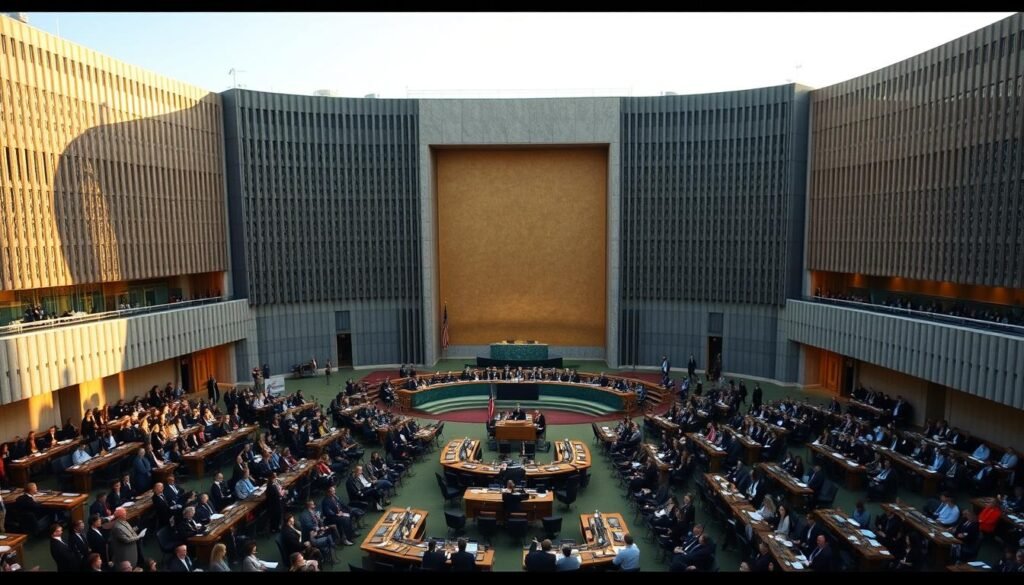
In 1965, a big change happened at the United Nations. The UNSC added four more non-permanent members, making it ten. This move was to make the Council more diverse and inclusive in making global decisions.
Increasing Non-permanent Members
Adding more non-permanent members was key. It brought in more views to the United Nations Security Council. This change let more countries join in on important talks.
This move made the UNSC more open. It showed how the world was getting more complex and connected.
Impact on UN Dynamics
This change had many effects on the UN. It helped the Council tackle global problems better. It also led to more talks and teamwork among countries.
But, it’s important to remember. Even with more voices, the big issues like veto power and permanent members’ seats were not fixed.
Calls for Reform: A Persistent Demand
The end of the Cold War in the early 1990s was a key moment. The Soviet Union’s collapse and the shift in global power sparked a push for UN Security Council reform. People say the current setup, made after World War II, doesn’t fit today’s world.
Post-Cold War Advocacy
After the Cold War, there was a big push for UN Security Council reform. Many wanted to add more countries, both permanent and non-permanent, to reflect the world’s changes. Countries said the Council should be more open to handle today’s global problems.
There were also calls to change or remove the veto power of the five permanent members. Critics say this power limits the Council’s ability to deal with crises.
Recent Renewed Efforts
In recent years, the call for UN Security Council reform has grown stronger. Today’s world faces big issues like climate change, pandemics, and conflicts. This shows the need for a Council that can quickly and fairly act.
Reform supporters believe it’s key for the Council to stay relevant and respected. They say it must adapt to the changing world to keep up with global shifts.
“The Council must evolve to reflect the realities of the 21st century” – A common sentiment among modern reform advocates.
Key Issues in Security Council Reform
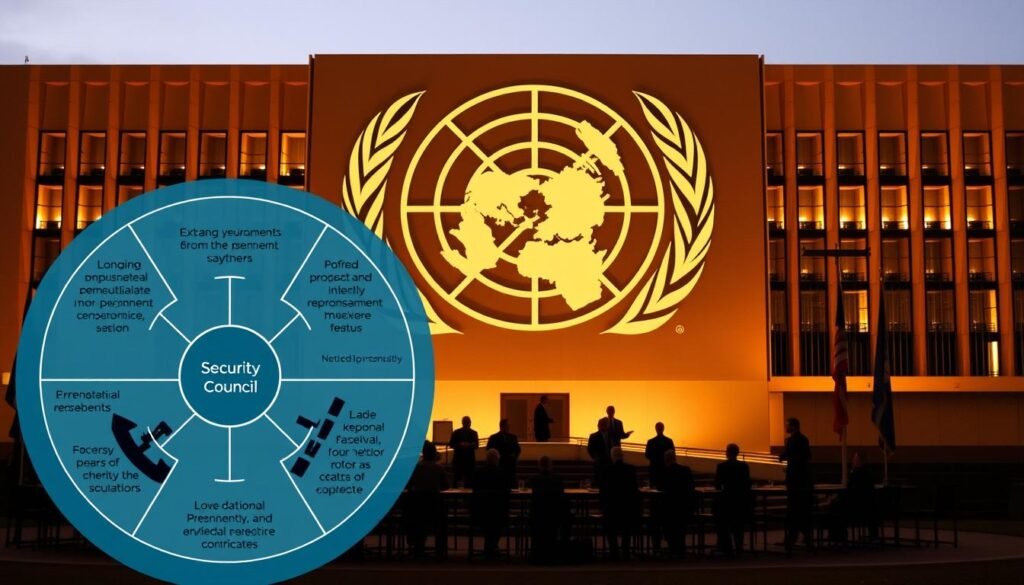
The reform of the United Nations Security Council (UNSC) is a hot topic. It’s about making the UNSC more effective. Many say the UNSC effectiveness is limited by the veto power controversy.
The five permanent members (P5) have too much power. They can veto any important decision. This blocks progress on urgent issues.
Another big issue is the lack of global representation. Countries like Africa and Latin America don’t have enough say. This makes the UNSC’s decisions less valid.
The Council also can’t handle today’s global problems well. Issues like climate change and cyber security are hard for it to tackle. Reform is needed to improve global cooperation and follow international law.
We must reform the Security Council to match today’s world. If we don’t, the UNSC’s ability to keep peace and security will keep falling.
The Role of the Veto Power
The veto power is a key but debated part of the United Nations Security Council. It lets any of the five permanent members—like the United States and Russia—stop any big decision, even if everyone else agrees. This shows how much the P5 influence affects international decision-making.
Even though it’s meant to keep the world stable by making sure big powers agree, the veto power is often seen as a problem. Critics say it stops important actions during emergencies. They think changing or removing this power could help everyone work together better.
The veto also sparks a big debate about fairness and its place in today’s world. Some say it makes the P5 too powerful, which hurts the idea of fair global leadership. Countries from different places think it goes against the UN’s values of democracy.
Looking at how the P5 influence works, we see that their interests often come first. This leads to calls for the Security Council to change. People want it to better fit the changing world of international relations.
Arguments for Increased Regional Representation
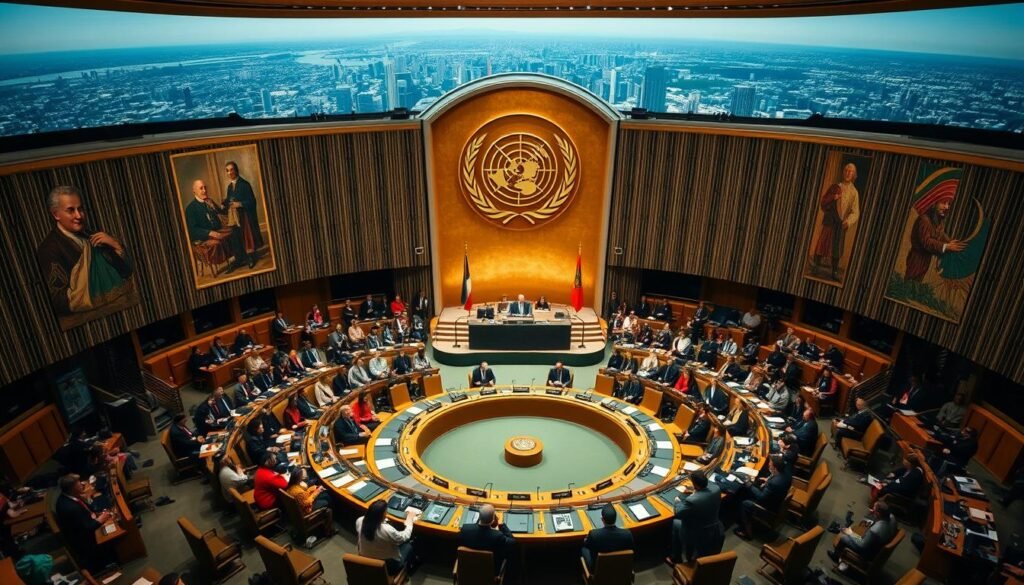
More regional representation in the UN Security Council is key for fair global governance. It brings in more diverse views, leading to better decision-making. This is very important for the global South, which has been left out for too long.
African Nations’ Growing Influence
African nations have grown a lot in economy and politics over the years. But, they don’t have enough say in the UN Security Council. Giving them more seats would show their growing importance and add to global diversity.
Asia’s Inadequate Representation
Asia, with its huge economies and people, doesn’t have enough voices in the Security Council. Countries like India, which are big players in the world economy, are often ignored. By adding more seats for the global South, we make the Council more inclusive and effective. This change will make the UN Security Council more legitimate and consider more viewpoints in making global policies.
| Continent | Current Seats | Proposed Seats |
|---|---|---|
| Africa | 3 | 5 |
| Asia | 2 | 4 |
| Latin America | 2 | 3 |
| Europe | 5 | 5 |
The UN Security Council and Global Legitimacy
The UN Security Council plays a key role in keeping the world peaceful. But, its ability to do so is often debated. The current setup, with permanent members and veto power, is seen as unfair by many.
This structure is criticized for not matching today’s world. It’s said to weaken the Council’s power and effectiveness in global decision-making.
To boost the Council’s standing, we need big changes. These changes should make sure everyone’s voice is heard. This way, we can create a more inclusive and fair system.
By making these changes, the UN can stay strong and relevant. It will be better equipped to handle today’s and tomorrow’s challenges.
One important change is to rethink the veto power. This power often stops the Council from acting quickly in emergencies. A more balanced and diverse Council would strengthen its role in the world.
This would make the UN more effective in keeping the peace. It’s essential for the UN to adapt to the changing world.
Competing Proposals for Reform
Reforming the UN Security Council has sparked big debates worldwide. These UN reform proposals include adding the G4 nations – Brazil, Germany, India, and Japan – as permanent members. Others suggest removing permanent seats or veto powers altogether.
Each proposal faces a complex web of international relations. It needs wide support to succeed. For example, adding the G4 as permanent members is popular but also faces opposition. Some argue that no new member should have veto power.
Other ideas push for a more democratic UN. They suggest giving more power to regional groups. This idea is part of a bigger push for fairness and representation in global policy debates. It shows how hard it is to balance different interests in international relations.
It’s clear that finding agreement on UN reform proposals will be tough. Yet, the talks highlight the need for the Security Council to change. It must adapt to today’s world.
The G4 Nations’ Position and Advocacy
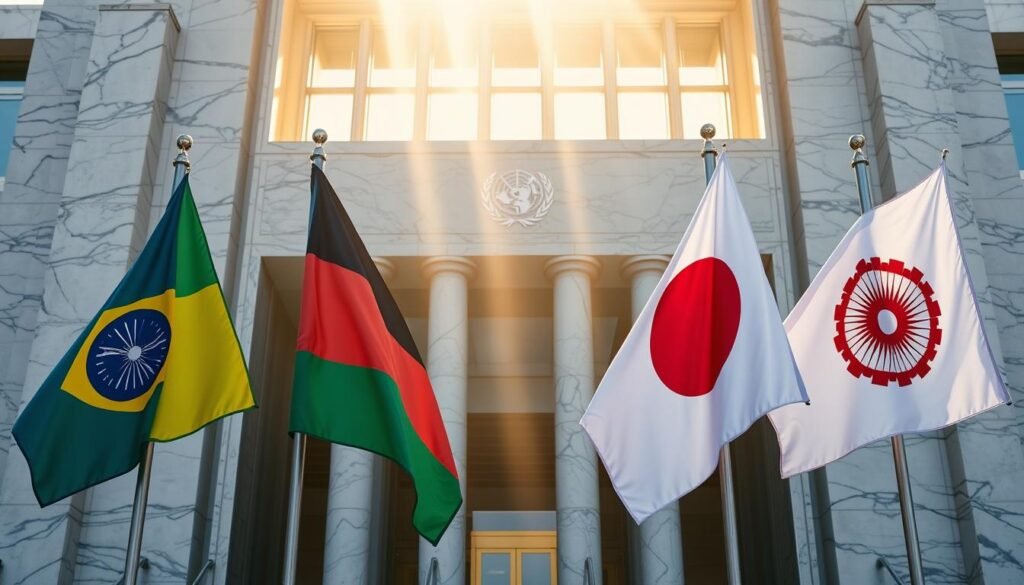
The G4 nations—Brazil, Germany, India, and Japan—are working together to join the United Nations Security Council (UNSC) as permanent members. They believe more representation will make global governance fairer. Each country has its own reasons, making their push stronger through international lobbying.
Brazil
Brazil wants a permanent UNSC seat because of its big role in UN peacekeeping and leading in Latin America. It says its big economy and global talks show it can help make UNSC decisions.
Germany
Germany is pushing for a UNSC seat because it’s Europe’s biggest economy and a key EU member. It believes joining will strengthen the council’s economic and political power. Germany also talks about its peacekeeping efforts.
India
India’s bid is based on being the world’s most populous democracy and its UN peacekeeping work. With a fast-growing economy and more influence in Asia, India wants a UNSC seat to show its growing global role. Its diplomats work hard to win support from other UN countries.
Japan
Japan argues it should be in the UNSC because it’s a big financial supporter of the UN and promotes peace. It points to its tech and stable economy as reasons for its value in UNSC decisions. Japan’s lobbying shows its dedication to a fair international system.
Opposition from the Uniting for Consensus Group
As talks about Security Council membership grow, the Uniting for Consensus group stands strong against the G4’s plans. Led by Italy and Pakistan, they fight against adding more permanent seats. They believe it’s not the right move.
Arguments Against Expansion
The Uniting for Consensus group says adding more permanent seats will make things worse. They think it will lead to more regional conflicts and make decisions harder. They believe in fairness and inclusivity in international talks.
They argue that a bigger Security Council would be less effective. It would struggle to keep the peace and security worldwide.
Alternative Reform Proposals
Instead, the Uniting for Consensus group suggests more non-permanent seats. This would let more countries join in Security Council talks. It keeps the core structure of permanent seats and veto power the same.
This plan shows their dedication to a fair and changing model of international talks.
The African Union’s Perspective on Reform
The African Union (AU) has always pushed for big changes in the UN Security Council. They want permanent seats for Africa. This is because Africa is growing stronger in politics and economy. They want fair global representation and to fix old problems in world leadership.
The AU speaks for many different countries in Africa. They say we need a fairer way to make global decisions. This would include more voices from Africa.
Africa is often talked about in the Council. This shows we need permanent African members. It makes global decisions more legitimate and effective.
This change is not just about adding seats. It’s about making sure everyone’s voice is heard. Every region’s concerns should be considered equally.
| Aspect | Current Status | Proposed Reform |
|---|---|---|
| Representation | Non-permanent, limited influence | Permanent seats for African nations |
| Decision-Making | Often externally influenced | Enhanced autonomy for African interests |
| Global Governance | Underrepresentation | Equitable participation |
The African Union wants the UN Security Council to change. They want more global representation and to include more regional interests. This big change will make global leadership fairer, more inclusive, and effective.
The P5’s Stance on Reform
The P5 nations have different views on Security Council reform. Their positions are based on their own interests and strategies. They aim to keep their power in the global scene.
The United States’ Position
The United States is open to Security Council reform. It wants changes that help its interests. But, it’s careful not to lose its power in the Council.
The U.S. likes to keep the veto power. This way, its plans and strategies stay strong.
China’s Opposition to Japanese Membership
China doesn’t want Japan to join the permanent members. This is because of old rivalries and tensions. China wants to keep its power in the P5 nations.
This shows how complex power and interests are in the Security Council reform talks.
France and the United Kingdom’s Conditional Support
France and the United Kingdom support reform but with conditions. They see the need for the Council to adapt to today’s world. But, they also want it to work well.
They suggest changes that keep the Council effective. This way, they can keep their influence and interests safe.
The Role of General Assembly in Security Council Reform
The UN General Assembly is key in changing the Security Council. It can approve changes to the UN Charter, which is vital for global talks. These talks shape how countries work together internationally.
Debates in the UN General Assembly show how complex and varied opinions are. Countries want the Security Council to be more fair and effective.
Task Force Recommendations
Several task forces have made suggestions to improve the Security Council. They want to add more members, introduce new regions, and change the veto power. These ideas aim to make the Security Council more legitimate and effective.
General Assembly Debates
Debates in the UN General Assembly have highlighted many views on reforming the Security Council. Countries have different opinions, from big changes to small steps. The main goal is to make the Security Council more inclusive and able to handle today’s global issues.
The table below gives a quick look at task force suggestions and key points discussed in the UN General Assembly:
| Recommendation | Purpose | Notable Supporters |
|---|---|---|
| Expansion of Membership | Increase representation and inclusivity | Brazil, Germany, India, Japan |
| Regional Representation | Ensure balanced geographic distribution | African Union |
| Veto Power Reform | Limit use of veto to enhance decision-making efficiency | Several Non-Aligned Movement Countries |
Innovative Reforms: Regional Organizations and Pooling Sovereignty
The idea of pooling sovereignty and working together regionally is becoming more popular. We’re looking to update how the world is governed. By studying the EU model, we see how countries can work together to change how decisions are made in the UN Security Council.
European Union as a Model
The EU shows that countries can keep their own power while working together on big issues. This model is interesting because it balances what’s best for each country with what’s good for all. The EU also shows how working together can make a country’s voice heard more clearly around the world.
Potential Impact on Global Governance
Using regional groups and shared power in the UN Security Council could change how the world is run. This new way of doing things means countries share the work and decisions, not just one country saying no. Groups like the EU, African Union, and ASEAN could help make international security more open and fair, leading to better global policies.
The European Union’s model of pooled sovereignty serves as a compelling example of the transformative power of regional cooperation in global governance.
Potential Pathways Forward for Meaningful Reform
Changing the UN Security Council needs a mix of strategies, teamwork, and new ideas. There are many ways to move forward, like talking diplomacy, building consensus, and testing new models.
One idea is to make changes step by step. This way, countries can agree on small steps first. It helps avoid big problems by keeping the Council working well.
Another idea is to try out new ways of voting and representation first. This lets everyone see if these changes work before making them official.
Finding the right balance is key. We need more voices but also a Council that can make decisions. Starting with small tests can help. It shows we’re serious about making things better.
Working together is also very important. When countries cooperate, they can trust each other more. This trust is needed for big changes. Talking to everyone helps make sure the Council reflects the world’s views.
So, we should think about both now and the future. Using different strategies, working together, and planning for tomorrow can make the UN Security Council better. This way, we can create a fairer and more effective Council.
Conclusion
The push for UN Security Council reform is vital. It helps us keep up with the world’s changing landscape and complex challenges. Making the Council better is key to its credibility and effectiveness in keeping peace.
Looking back, we see efforts to change the UN have shaped our future. The success of these reforms will greatly impact how we work together globally. It’s important to make sure everyone’s voice is heard in these changes.
Moving ahead, we must stay dedicated to making reforms happen. This will help us tackle global issues better together. By doing so, we aim for a safer and more united world.
